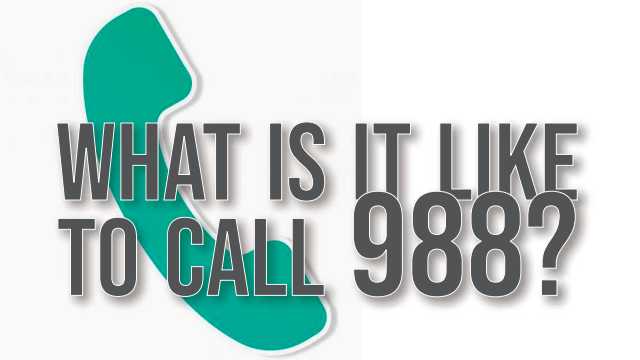By Carol Stiffler
In the midst of a personal crisis, many people find it nearly impossible to reach out for help. That difficulty is common: A 2022 study conducted by OnePoll asked 2,000 Americans how far they’ll go before asking for help, and 77 percent of respondents said they wait until the situation is an emergency.
A Harvard Business Review article said fear of rejection and being vulnerable are two hurdles that keep people from asking for help.
Because reaching out can be scary, counselors who answer calls on the 988 suicide and crisis hotline have been trained to listen and assist callers in their darkest moments without passing judgement.
To see what it’s like to call 988, I phoned the hotline and reached a woman with a slow, gentle, steady voice. She told me her name, which she admits is an alias. All crisis hotline counselors keep their true identity secret. I was not required to identify myself at all, though I did, and told her my call was for research and an article. I’m not sure she believed me.
Before reaching the counselor, automated prompts asked if I were a veteran or a member of the LGBTQ community. Those calls are directed to counselors who specialize in those areas. I selected the main option. I was immediately connected to a counselor.
My crisis counselor was calm and spoke slowly – completely without ego or any brash, intimidating commentary. She was an excellent listener. She and her coworkers had been trained by Common Ground, she told me, a mental health facility in Pontiac, Michigan.
“Our main goal is to move individuals from crisis to hope,” she said. “That is our goal here, our mission.”
Safety for today is realistic: To get the caller safely through the day. Recovering from depression, anxiety and other mental health struggles is a much longer process, and one that 988 can’t take on. They work in the moment, then offer resources for continued care.
“We do offer follow up calls as well,” she said. “If someone is comfortable and would like one of us to check on them the following day, and they consent, we follow up the next day.”
Treating my call with concern, she offered me a follow up call even though I had told her my motive for calling – she was double checking that I hadn’t actually called for help.
Follow-up calls are completed by a different counselor, and requests for a specific counselor are not accepted.
“We have a strict protocol,” she said. “If a caller calls, the crisis worker that answers takes the call. We don’t want to make them dependent on the worker or on the crisis line.”
If a caller has taken steps to harm themselves, others, or end their lives, 988 counselors will notify police. Otherwise, they encourage callers to phone 911 on their own.
After his suicide death in May, Nathan Seitz’s mother reviewed his cell phone and computer with log-in information that Nathan left behind for her. Though his mother, Kristen Salter, had been deeply involved in his mental health care for years, portions of his care were not made known to her after he turned 18 and became an adult.
Salter didn’t know that Seitz called 988, and did so more than once.
“Now I know, in fact, that he did,” she said, finding the revelation when reviewing his phone log after his death.
“That’s the stigma of mental health,” Salter said. “Nobody wants to look crazy, or vulnerable, or like they don’t have it together. Nobody wants to flare that around. They want to do things in quiet for themselves – self medicate or call a crisis line.”
Since losing him, Salter has been throwing her energy into improving the mental health landscape overall.
In his memory, Salter launched a new four-year scholarship fund for any Newberry graduate who plans to go into mental health care. The fund has nearly $10,000 in it, and Salter is planning more events next year to add to that total.
She’s also completed the 988 training herself, though she doesn’t answer calls on the crisis hotline.
Because she found the training beneficial, she is contracting a trainer to come to the Newberry area to offer two-day Applied Suicide Intervention Skills Training (ASIST) course on February 22 and 23. More details will be shared when they are available.
“The training was awesome,” Salter said. “It helps you pick [questions], whether you know them or not. You ask: ‘Are you suicidal? Having suicidal thoughts? What can we do right now to keep you safe?’”
Salter has also created a spreadsheet full of resources for mental health that shows which organizations can assist, what they do, and how to reach them. She’s planning to give them to local doctors and hospitals to be passed out to patients who are diagnosed with depression.
“If we can do more, why not do more?” she said.
For info box:
More than 46% of callers had high or overwhelming stress at the beginning of a call, which was reduced to 16% by the end of the call after speaking with a 988 specialist. The 988 Lifeline connects residents to behavioral health services, resources and referrals to follow-up care.
Anyone with concerns like these can call for support:
Mental health-related distress.
Thoughts of suicide.
Substance abuse crisis.
Emotional distress.
Help finding a behavioral health resource.
In addition to calling 988, a Muskegon County-based “warm” line is available at all times at (800) 273-TALK.












